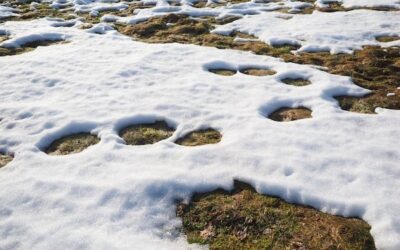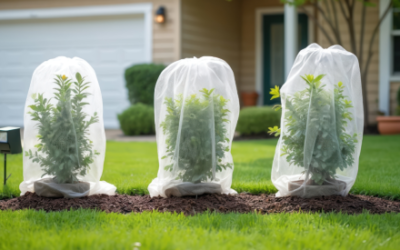It’s February, and the snow has already blanketed the country, and maybe you didn’t get your lawn as ready for the winter months as it should have been. Well, we’re here to give you some tips on how to prepare your lawn for ice and snow so that as we tip-toe closer to winter, you can make sure you take special care to maintain your lawn.
Preparing your lawn for the winter can ensure a lush and green turf during the spring. Here are some things you can do to protect your lawn from the cold.
1. Rake Your Leaves
Raking your leaves is probably the most important item on a winterization checklist. You need to prepare your yard for the winter by getting rid of dead leaf mulch. A thick carpet of wet leaves will freeze as the cold sets in and destroy your lawn. They can suffocate your turf and leave you with nothing but a large patch of dirt come spring.
2. Fertilize Your Lawn
Your lawn needs all the nutrients and strength it can get to get through the winter. Fertilizing your lawn will strengthen your grass’ roots and ensure that when the snow melts, you will have a green and vibrant lawn on your hands.
Make sure to spread fertilizer evenly across the landscape sometime between mid to late fall. Make sure you have a clear and well-fertilized lawn before the onset of winter.
3. Aerate and Sow Seeds
Following fertilization, you need to aerate your lawn to help your roots remain healthy through the winter. Lawn aeration lets your grass’ roots grow deep and strong under the snow and flourish during springtime.
You should perform lawn aeration during late summer or early fall, while the weather is still warm. The soil is easier to penetrate at this time of year. If there are areas of your lawn that are thinning out, you can sow cool-season grass seed and water your lawn a little. Come spring, these seeds will take root and grow green and bright.
4. Stop Watering
As the weather grows colder, you no longer need to water your lawn as much as you used to during the summer months. During the winter, the soil no longer needs as much water as it did during the summer. In most cases, continuing to water your lawn can make it oversaturated.
It’s also advisable to drain your sprinkler system as your plumbing can freeze and burst under extreme conditions. So if you haven’t already, change your irrigation schedule to suit the weather.
5. Cut Your Grass
Your grass won’t see much growth between October and November. It’s wise to cut it before the first frost strikes so that it can flourish during the spring. Bear in mind that cutting your grass for the winter is different from cutting your grass for the summer.
If you have tall grass on your lawn, it will succumb to the snow and create a damp environment that breeds plant diseases. Cutting your grass too short can hurt your lawn and hinder its growth during the spring. It’s usual practice to cut your grass an inch or so higher than the summer cut.
6. Leave the Snow Alone
While you need to clear snow from your driveway and sidewalks, remember to avoid plowing your lawn. It is a little-known fact that snow actually preserves and protects your lawn from extreme weather conditions. So shoveling snow that’s settled on top of your lawn will not only damage and disturb your grass but also remove its protective cover.
Caring for your lawn is hard, time-consuming work. If you don’t have the time and resources to maintain your lawn, don’t worry. Our experts at Jack’s Lawn Care & Landscaping, LLC provide top-quality lawn care and landscaping services in Charlottesville, VA. Contact us today to get a free estimate!



